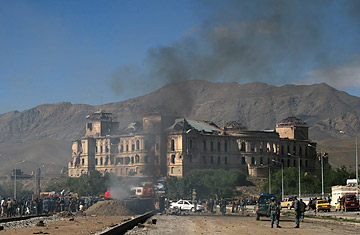
Smoke billows from the site of a suicide car bomb attack in Kabul
I heard the sound as I was getting out of bed — a distant boom, like thunder. From my last assignment to a war zone, Baghdad, which I left at the beginning of 2009, I had grown used to thinking that every boom was a bomb going off. Even though I knew it was illogical, I'd sometimes jump out of bed to look. But this was my first week in Kabul, which was so far, for me, completely unlike Baghdad. The city center teems with life, and moving about is far more relaxed. So I told myself the noise was a dump truck. But later, when I sat down to eat breakfast, the manager of the guesthouse told me there had been a car bomb.
Around 8 a.m. on Tuesday, a suicide bomber struck a NATO convoy in southwest Kabul, about three miles from the guesthouse, killing at least 12 civilians and six foreign soldiers, five of whom were American; 47 others were reported wounded, many of whom were the civilian passengers of a bus, according to the Interior Ministry. The Taliban took responsibility for the bombing, and several analysts said the attack likely reflected Taliban opposition to President Hamid Karzai's upcoming peace jirga — a national meeting aimed at charting a path for reconciliation with the Taliban and other insurgents. "It shows how opposed the Taliban are to the peace jirga and Karzai's [recent] trip to the United States," Ahmad Saeedy, a political analyst and former Afghan diplomat, told me. "The Taliban are trying to show the world that Afghanistan is not secure. It also shows the vulnerability of Kabul and of the government, because the government can't even control Kabul."
The Afghan capital is an ambiguous place. The pedestrian and traffic-choked roads, the gleaming villas of the nouveau riche (or "Narchitects," as my fixer calls them) and dozens of private schools all seem to be signs of security and prosperity. Or are they a mirage?
Even with Tuesday's bomb blast, some Afghans maintain that terrorism incidents in Kabul are still few and far between and that the capital remains relatively safe from the turmoil that seems to be increasingly engulfing other provinces. On most days, they say, Kabul prospers. Until Tuesday's blast, the last major incident — the bombing of two guesthouses popular with foreigners — was almost three months ago.
Sanjar Sohail, the publisher of one of Afghanistan's largest dailies, is one of Kabul's boosters. While he agrees that the Taliban were behind Tuesday's attack, he doubts that they can stage another attack in Kabul anytime soon, because it takes a while to figure out how to penetrate the capital's heightened security. When I talked to him a few days ago, he listed the signs of Kabul's progress: "We have about 40 to 45 private universities in Kabul — just in nine years. We have about 25 TV channels in Kabul. We have 15 daily newspapers in Kabul. We have five telecommunications companies. We have five private airlines."
